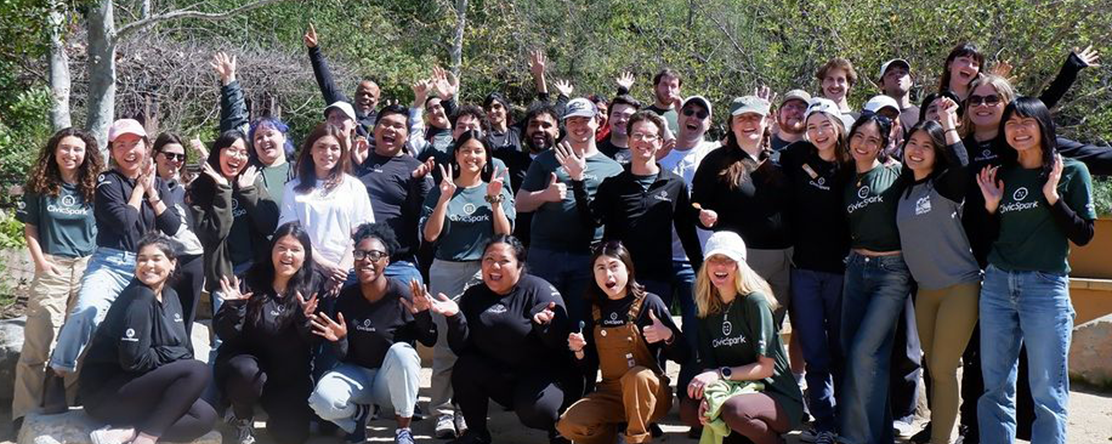
Update
Organizational Applications Open: Host a PHI CivicSpark Fellow
-
Focus Areas
Capacity Building & Leadership, Healthy Communities -
Issues
Climate Change, Wildfires & Extreme Heat, Workforce Development -
Expertise
Coalition & Network Building, Leadership Development, Technical Assistance -
Programs
CivicSpark

PHI’s CivicSpark is accepting applications for organizational partners who are interested in hosting CivicSpark fellows beginning in January 2025.
CivicSpark places highly motivated emerging leaders with local organizations to support research, planning, and implementation projects for community resilience. CivicSpark staff work with project partners to coordinate a positive fellowship experience. Site Supervisors provide direct project supervision of Fellows, with support from CivicSpark Regional Coordinators and other program staff.
The application deadline for partners is November 15, 2024.
learn more and apply
CivicSpark was recently awarded AmeriCorps National Direct grant to support the program’s expansion, with plans to place 100 additional government agencies and nonprofit organizations to host CivicSpark Fellows and serve additional communities in our existing states and new areas across the country beginning in January through September 2025, for 7.5 month fellowships.
The program’s initial plans for expansion include bringing CivicSpark to regions disproportionately affected by the impacts of climate change and natural disasters to serve communities in at least 12 additional states across the West, Pacific Northwest, Southeast and Mid-Atlantic, with additional geographic expansion likely in years to come. New states targeted for January 2025 are Arizona, District of Columbia, Florida, Georgia, Hawaii, Nevada, New Mexico, North Carolina, Oregon, South Carolina, Texas and Virginia.
Civic Spark has been an essential partner in our office and in our county, providing fellows who are highly capable, intelligent, serious and committed to their projects...CivicSpark has been a tremendous benefit to our local governments and the community at large.Partners from the Air Pollution Control District
Beyond the program’s basic requirements, PHI’s CivicSpark is looking for project partners with a commitment to Fellows’ growth and development through direct project oversight, a dedicated Fellow supervisor, and a supportive professional environment.
Projects must support local community resilience needs such as climate change adaptation or mitigation, affordable housing, energy efficiency, water management or policy, sustainable mobility, or other related issues. Beyond the basic criteria, our program is looking for tangible and impactful resilience projects with a:
- Clear, suitable scope of work
- Commitment to implementation
- Strong connection to public agencies’ needs
Partner eligibility includes:
- Public agencies (local, county or regional governments), state agencies, Tribes, and non-profit organizations can contract directly to host CivicSpark Fellows
- Fellows cannot be placed at for-profit organizations
- Fellows must implement projects or initiatives with a clear scope of work designed to build organizational capacity on a community resilience issue
- Partners must agree to follow all AmeriCorps requirements
Learn more:
Watch CivicSpark’s “WA/CO/New States Three Quarter Timeline Info Session” to learn more about the application process and timeline, partner fees, costs and fellow stipends, and more.
WatchMore Updates
Work With Us
You change the world. We do the rest. Explore fiscal sponsorship at PHI.
Support Us
Together, we can accelerate our response to public health’s most critical issues.
Find Employment
Begin your career at the Public Health Institute.



